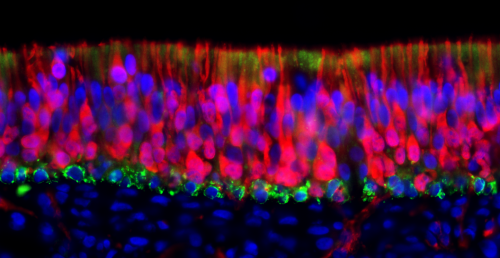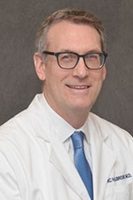Proof-of-concept research may accelerate the development of smell restoration technology.
Estimated to occur in five percent of the population, anosmia is a phenomenon that reduces and/or eliminates a person’s ability to smell.
In some instances of smell loss, there is a treatable, underlying cause that’s easy to pin down, such as sinus disease. Treating the root of the problem typically restores the ability to smell. In other cases, however, anosmia is caused by damage to sensory nerves for which there are currently no proven therapies.
According to Eric Holbrook, MD, director of Rhinology at Massachusetts Eye and Ear, we attribute such cases to the nasal cavity (olfactory) nerves not functioning properly.
Developing regenerative therapies
Olfactory nerves have the ability to regenerate on their own, but this doesn’t always happen.
“Similar to investigators attempting to regenerate hair cells to help those who cannot hear, we are searching for a means to restore the nerves of the nose to induce smell,” Dr. Holbrook said. “Just like regenerating hair cells, restoring the sense of smell in humans will take time.”

Electrically stimulating the nose
While investigators work on hair cell regeneration, patients with profound hearing loss do have the option of cochlear implants, which are surgically implanted devices that restore hearing.
Taking the cochlear implant as inspiration, Dr. Holbrook’s colleagues from the Virginia Commonwealth University (VCU) School of Medicine have been testing the idea of an olfactory implant system that uses electrodes to stimulate smell.
To determine if this technology is feasible, Dr. Holbrook became the first person to apply an artificial electrical stimulation of smell through the human nasal cavities and sinuses. In a recent study published in International Forum of Allergy & Rhinology, Dr. Holbrook describes that three of five patients reported sensations of smell as a result of the stimulation.
“Our work shows that smell restoration technology is an idea worth studying further,” Dr. Holbrook commented. “The development of cochlear implants, for example, didn’t really accelerate until someone placed an electrode in the cochlea of a patient and found that the patient heard a sound of some type.”
A proof of concept established
Now with established proof of concept, doors have opened for a ‘cochlear implant for the nose’ to be developed in parallel with the work on nerve regeneration. Dr. Holbrook and his team do caution that the concept of an olfactory stimulator is more challenging than existing technologies, however.
“There’s currently so little that we can do for patients with smell loss, and we hope to eventually be able to re-establish their sense of smell,” Dr. Holbrook said. “Now that we know that electrical impulses to the olfactory bulb can provide a sense of smell, that’s encouraging.”
 Eric Holbrook, MD, specializes in complex sinus and endoscopic skull base surgery. He sees patients at the Mass. Eye and Ear Sinus Center, located at our main campus in Boston.
Eric Holbrook, MD, specializes in complex sinus and endoscopic skull base surgery. He sees patients at the Mass. Eye and Ear Sinus Center, located at our main campus in Boston.
This technology has great promise though I am aware it is a long away from implementation. Though I greatly miss my sense off smell, the associated loss of taste (other than sweet, sour, bitter, salty, umami) is equally problematic and would be aided by Dr. Holbrook’s work.
I can not taste or smell any longer. More recently I have moments of taste recognition but only slightly. is there any thing I can do to correct this condition. This article brings on new hope.
Thank you. Linda Flomenhoft
Does this require the presence of the cribriform plate? For those patients with olfactory neuroblastoma who have had their olfactory nerves removed, could the cochlear implant still work? Or not?
“Unfortunately the concept of an implant to restore smell is still early in the development stage. We do not yet have an actual device that can be tried in humans. We hope this will be available in the future. With surgery for olfactory neuroblastoma, the olfactory nerves and the olfactory bulbs are typically removed. Since the idea of an implant is based on stimulating the olfactory bulbs, it may not be useful for patients that have had surgery for these tumors” -Dr. Holbrook.
My mom and I have been waiting our whole lives for this news! We were both born with almost no sense of smell. Is there a way to get on a list for clinical trials? Thank you!
Fascinating results here Dr. Holbrook. Currently doing research at my university for my Biomedical Engineering course. Looking forward to the future of this treatment!
-Nahom S.
Thanks so much for your comment and your support, Nahom! We’ll be sure to keep our readers updated.
Has this technology thought of being implemented because of the many people that have lost sense of smell or limited smell from Covid?
I am 57 years old and I haven’t had a sense of smell or taste for many years. Would love to be a test candidate for this if it ever comes to be. I did have surgery for deviated septums, allowing me to be able to breath through my nose a little better. Thank you, Patricia A McEvoy